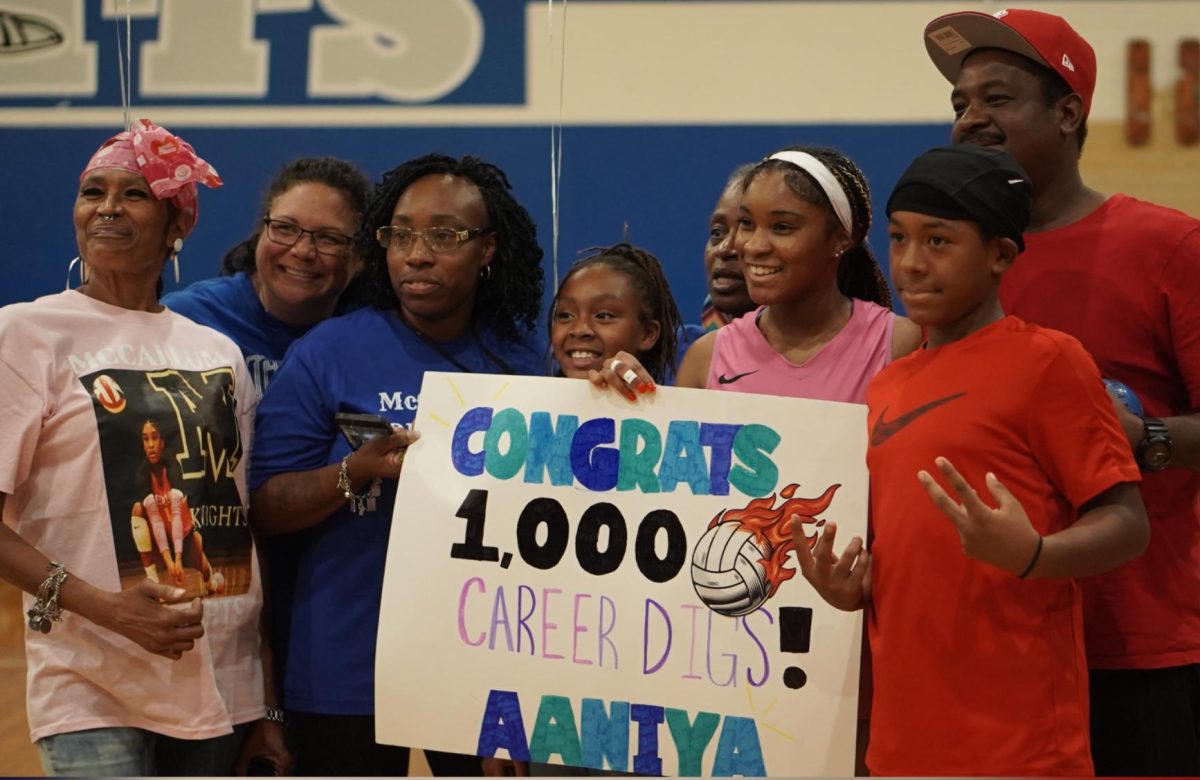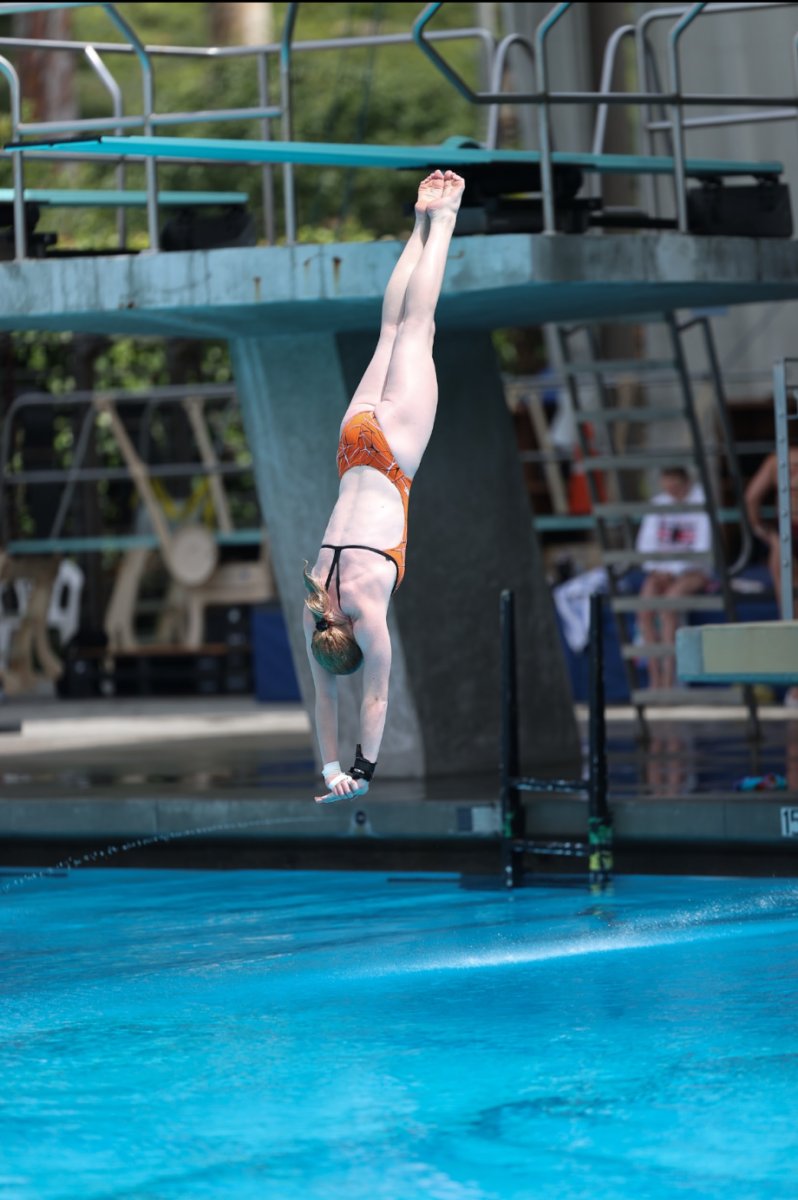The Shield: Can you tell me a little bit about the UIL competition on Aug. 23?
Claire Rudy: It was our UIL competition and since it’s not a state year for us this year, it’s like our main contest of the year: what we’re building up for, what summarizes our marching season and what we’ve been working for. Division 1 ratings are the best, and I think Division 4 is the worst. We ended up getting straight 1’s yesterday.
TS: Do you get multiple ratings from different judges?
CR: Yes, there are a few judges, and they have different categories that they are judging. There is musicianship and marching technique and other things, and then they will grade you on those scales, and straight 1’s means the average of all their scores ending up being a 1, or they all submitted 1’s.
TS: When did you start doing color guard?
CR: I started freshman year, so four years.
TS: What got you interested in that?
CR: I knew that I wasn’t going to be able to play my instrument, [the oboe], marching on the field because the reed doesn’t work, and it is such a sensitive instrument that being outdoors would be weird for it, but my older sister, went here and she did color guard because she also couldn’t march her instrument. And my dad used to do color guard, and I’ve just been around it, so I was like, ‘I want to try it.’ Really I could have played flute or something like that in the marching band, but I like the color guard uniforms a lot more.

Senior Claire Rudy acknowledges the cheering crowd after her name was called during swim team introductions at the Pink Week Pep Rally on Oct 18. Photo by Kristen Tibbetts.
TS: How did that start, you doing color guard freshman year?
CR: It’s learning an entire new skill set. I remember coming to one of the camps in eighth grade in May. We called it our audition, but really it was, ‘Let’s see if you can learn this and see how you like it,’ and I remember I was struggling with it, and it was really difficult to figure out. I was like, ‘I don’t know how to do this. I don’t know how this is going to work out,’ but as you do it more and more, like when summer band camp happens, and we spend all day working on technique things and just getting to be part of a group, you pick up on it. It was fun.
TS: What is your favorite part about it?
CR: We just started saber this year, which is a new piece of equipment. It looks like a sword, and I really like that so far, it’s been really fun.
TS: What do you guys do during the non-marching season?
CR: In the non-marching season is our winter guard season which really starts in winter, so it officially starts in January, but I guess we will be starting on it kind of early this year, getting our show under way and learning equipment, but that’s just solely color guard, and it’s indoors, so we’ll perform in a gym of a school and it’s on a tarp, and it’s just color guard, and it’ll be fun.
TS: Do you guys use the same equipment?
CR: Yeah, we use flags, poles and sabers. It’ll be different looking probably. We’ll probably get a new set of flags. We’ve had colored rifles before, but that is just putting tape on it. I don’t know if we’ll do that again.
TS: Since you’re on the swim team too, how do you manage morning band practices and practices for swim team?
CR: It makes for really long days, but marching rehearsal starts at 6:50 [a.m.] and then swim practice goes from 8-9:30 [p.m.]. And then we live in Southwest Austin so it’s also a lot of driving and a lot of car time, so it’s a balance between figuring out when to sleep and when to do homework. It’s a lot of moving, but I like it. It’s good to be busy. It also makes weekends, if I’m not doing anything, like, ‘I need to calm down.’
TS: What got you into swimming?
CR: I’ve done swimming since I was 5. I’ve never done year-round swimming, which I kind of have some regrets for not doing, but at the same time I knew I wanted to do band and focus on school, band and color guard, and if I do year-round swimming, that’s going to take up everything, so I have done a summer league since I was 5, and it’s my neighborhood one on the City of Austin League. My sister did swimming first, and I remember signing up for lessons, and they were like, ‘You should really continue this,’ so I went and joined swim team and ever since then I’ve been in to it. I love the sport. It’s something you can do forever because it doesn’t have to be fast, it can be therapeutic. That’s why you see people that are 90 years old still swimming.
TS: How has the swim season been so far this year?
CR: It’s been good. We have a junior that just recently broke one of our team records, so people have been doing well. There is a lot of new freshman this year and so it’s good to see a lot of new people learning as well.
TS: What is it like to have your dad also be your coach?
CR: Interesting. There’s ups and downs definitely. It’s nice in a way. I don’t have my license so my dad goes everywhere with me already, so I have a ride. I don’t have to worry about that. It’s nice to always have someone to turn to that I know really well.
TS: Did your dad do swim team in high school too?
CR: No, he’s never done swim team, but he’s watched my sister and I swim, and he’s one of those people that can pick up on stuff for whatever reason. He’s just naturally talented at stuff.
TS: What are you most looking forward to?
CR: For the rest of the season I am really looking forward to winter guard for sure because we had a really good season last year and ended up making state, so I really want to do that again. That would be awesome. My goal for swimming this year is just to be there. I didn’t really have a season last year because I was out all the time with a concussion.
TS: How did you get a concussion?
CR: I swam into a wall really hard. It was on backstroke and your bound to hit the wall at some point. I’ve done it a million times; it just happens, but it just happened that I was sprinting and usually you will have something to block the way, like your arm will hit first and you’ll slow down, but for some reason I had nothing, and so I just went straight into the wall. It happened in last September and it affected me throughout November and then after swim season, when I came back I qualified with a relay team to go to regionals, but I ended up getting the flu so I didn’t go to regionals.
—interview by Kristen Tibbetts








